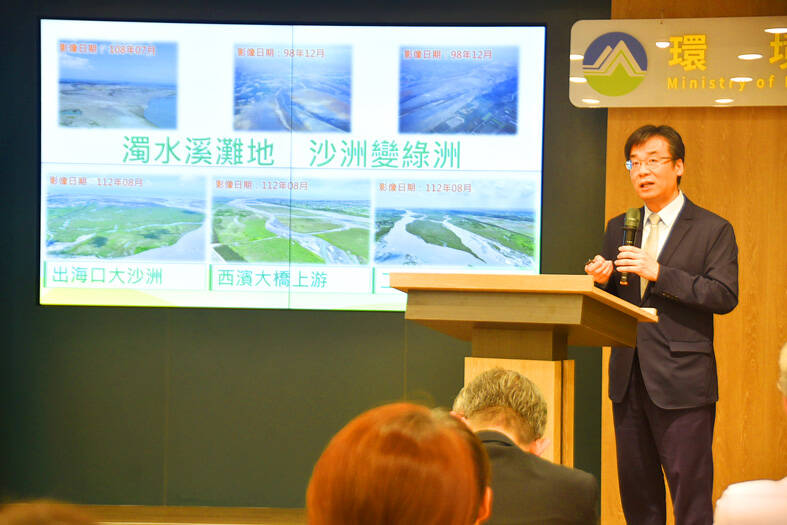The Ministry of Environment collaborated with local governments to control fugitive dust along the Jhuoshuei River (濁水溪), reducing incidents by 78 percent over the past seven years.
The dust control program was implemented in 2018 under instructions from then-premier William Lai (賴清德). It has integrated interagency resources to improve controls through hydraulic engineering, riverbank tree planting, and disaster prevention and response.
Deputy Minister of Environment Shen Chih-hsiu (沈志修) yesterday told a news conference that the vegetated area along the river has increased by 991 hectares from 2017 to 2023.

Photo: Wu Po-hsuan, Taipei Times
The number of fugitive dust incidents declined to five from 59 over the same period, Shen said.
Although dust control facilities were damaged by three typhoons last year, they were all fully restored by February, attesting to Taiwan’s climate resilience, he said.
Department of Atmospheric Environment Director Huang Wei-ming (黃偉鳴) said the river is prone to fugitive dust in northeasterly monsoon winds due to farming methods in the region.
Siltation and flooding that washes away control facilities also exacerbated the problem, Huang said, adding that about 2,000 hectares of the 6,553 hectares along the segment of river being managed were prone to fugitive dust.
Hydraulic engineering and afforestation approaches were applied, decreasing the area of exposed land by 77 percent, he said.
The goals are to have dust controls on 91 percent of the land by next year, reduce fugitive dust incidents to two to four days per year and ensure acceptable air quality across the region, he said.
The efforts to restore fugitive dust controls after last year’s typhoons have boosted the resilience of the river area, Huang said.
There was 849 hectares of land exposed by the typhoons last year, down about 50 percent from 1,730 hectares in 2017, he said, adding that the time to restore the land was cut by 80 percent to seven months from 36 months over the period.
The wind speed threshold to generate fugitive dust is up to 10.2 meters per second (mps) this year from 4.9mps in 2017, he added.
Lee Yu-ping (李友平), director of the Water Resources Agency’s Fourth River Management Branch, said that PM10 — an indicator of airborne particles measuring 10 micrometers or less — in the region had decreased by about 50 percent from 2017 to last year.
The improved environment has led to a recovery of local ecosystems, attracting birds such as oriental white storks and black-faced spoonbills, Lee said.
Mailiao Cultural Association president Wu Ming-yi (吳明宜) said the restoration of the river’s wetland has benefited local residents.
The central government should continue to support the local government to protect the river’s environment, Wu added.

The Coast Guard Administration (CGA) yesterday said it had deployed patrol vessels to expel a China Coast Guard ship and a Chinese fishing boat near Pratas Island (Dongsha Island, 東沙群島) in the South China Sea. The China Coast Guard vessel was 28 nautical miles (52km) northeast of Pratas at 6:15am on Thursday, approaching the island’s restricted waters, which extend 24 nautical miles from its shoreline, the CGA’s Dongsha-Nansha Branch said in a statement. The Tainan, a 2,000-tonne cutter, was deployed by the CGA to shadow the Chinese ship, which left the area at 2:39pm on Friday, the statement said. At 6:31pm on Friday,

The Chinese People’s Liberation Army Navy’s (PLAN) third aircraft carrier, the Fujian, would pose a steep challenge to Taiwan’s ability to defend itself against a full-scale invasion, a defense expert said yesterday. Institute of National Defense and Security Research analyst Chieh Chung (揭仲) made the comment hours after the PLAN confirmed the carrier recently passed through the Taiwan Strait to conduct “scientific research tests and training missions” in the South China Sea. China has two carriers in operation — the Liaoning and the Shandong — with the Fujian undergoing sea trials. Although the PLAN needs time to train the Fujian’s air wing and

The American Institute in Taiwan (AIT) put Taiwan in danger, Ma Ying-jeou Foundation director Hsiao Hsu-tsen (蕭旭岑) said yesterday, hours after the de facto US embassy said that Beijing had misinterpreted World War II-era documents to isolate Taiwan. The AIT’s comments harmed the Republic of China’s (ROC) national interests and contradicted a part of the “six assurances” stipulating that the US would not change its official position on Taiwan’s sovereignty, Hsiao said. The “six assurances,” which were given by then-US president Ronald Reagan to Taiwan in 1982, say that Washington would not set a date for ending arm sales to Taiwan, consult

A Taiwanese academic yesterday said that Chinese Ambassador to Denmark Wang Xuefeng (王雪峰) disrespected Denmark and Japan when he earlier this year allegedly asked Japan’s embassy to make Taiwan’s representatives leave an event in Copenhagen. The Danish-language Berlingske on Sunday reported the incident in an article with the headline “The emperor’s birthday ended in drama in Copenhagen: More conflict may be on the way between Denmark and China.” It said that on Feb. 26, the Japanese embassy in Denmark held an event for Japanese Emperor Naruhito’s birthday, with about 200 guests in attendance, including representatives from Taiwan. After addressing the Japanese hosts, Wang